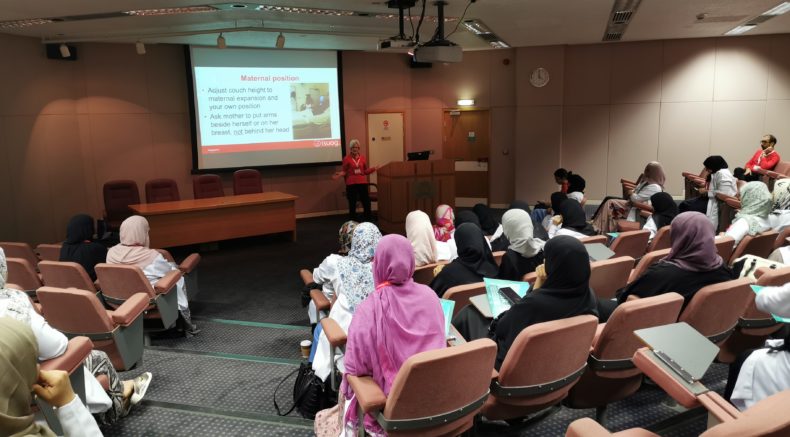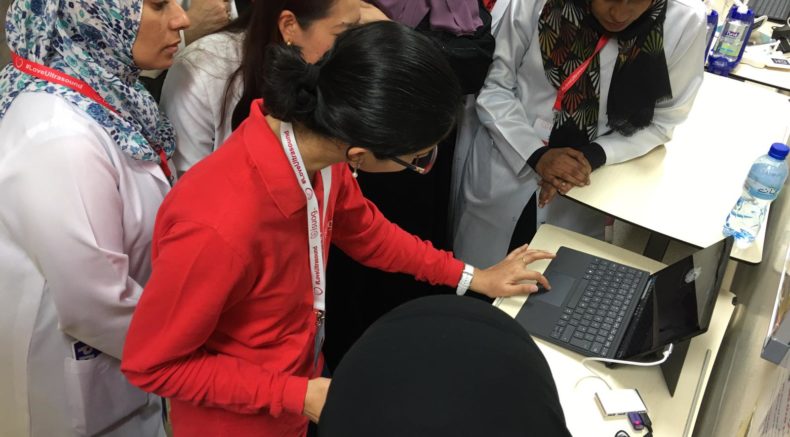The ISUOG team returns to Muscat to inaugurate Phase II of the Outreach program. Much like Phase I, the program will consist of three trips to the country but the main goal will be to empower the new trainers (dubbed NUE Trainers – New Ultrasound Educators) to hone in on their teaching skills to then take their training forward in providing training nationwide, as envisioned by the Oman Government in working with ISUOG.
Trip 5: 02-06 February 2020
Project Title: ISUOG Outreach training in ultrasound in obstetrics and gynecology in Oman - Phase II Trip 2
Location: Muscat, Oman
Dates: 02-06 February 2020
Project partners: Omani Ministry of Health, GE Healthcare

Lecture on how to hold a probe
Titia Cohen-Overbeek, project lead, explaining how to hold a probe properly

Utilizing OPUS simulators
Divya Singh, ISUOG volunteer, shows how to use OPUS simulators as a practice tool.
ISUOG Training team:
Dr. Titia Cohen-Overbeek (The Netherlands) - team leader
Dr. Divya Singh (India)
Dusan Lj Milenkovic (ISUOG)
Katharine Smith (ISUOG)
Gesu Antonio Baez (ISUOG consultant)
Project purpose: To provide ultrasound training to local OB/GYN practitioners in Oman with the intention that these trainees eventually become local trainers.
Project deliverables:
Goal: By the end of Phase II, local trainers will be able to comfortably train in OB/GYN ultrasound trainees to be competent in scanning techniques and conduct quality scans in line with basic training outreach templates (SO2).
Output: Empowering dedicated local trainers in training basic ultrasound in OB/GYN scanning and hone in on their skills by evaluating their progress and provide mentoring between programs.
Outcome: Trainers will be competent in delivering OB/GN ultrasound training to help increase level of anomaly identification and aid in preventing preventable causes of maternal mortality locally.
Participants: 29 trainees from across the Sultanate
Training location: Royal Hospital, Muscat
Training summary:
This was the second trip for Phase II of the Outreach Program in Oman. The overall purpose and intention of the program was to empower the trainees identified as trainers (now called NUE Trainers – New Ultrasound Expert) to undertake OB/GYN ultrasound training to then ultimately carry it out on their own with the support of the Omani government in the form of a national training session. Additionally, this trip was a decision gate for several potential trainers and trainees in terms of the continuation of their participation.
As in Trip 1, two ISUOG trainers supervised the training of the NUE trainers and assessed their performance in order to coach and mentor them in their teaching skills. The program consisted of hands on scanning taking place in the morning (8:00 to 12:30) with lectures taking place in the afternoon (13:30 to 15:30). ISUOG team brought OPUS simulators which were utilized during the hands on scanning by the trainees who were not doing the scans at the moment. That proved to be a very good solution for additional practice and improvement. A part from mentioned sessions, during the course of training the ISUOG team included several sessions which they thought are needed, such as How to hold the probe.
Those trainees from Phase I who were identified as potential trainers but not yet qualified as trainers took part as observers and assistants to the NUE Trainers, learning from them and observing how to better fine tune their teaching skills. After the Trip 2 was over, we have decided to upgrade their role in the final trip of the Phase 2, thus they will be acting as NUEs as well.
Dusan Milenkovic, Katharine Smith and Gesu Antonio Baez (consultant) as ISUOG team coordinated the project delivery, as well as the validation process. Dr Divya Singh, who participated in the Phase1 of the programme, was invited to pair Project Lead, Dr Titia Cohen-Overbeek, in overseeing the training and the NUEs’ delivery.
To assess the trainees, pre and post theoretical and practical assessments were employed as was done previously. At the end of the training, ISUOG team and the NUEs organized a “round table” to score and give feedback to each of the trainees, with scores from A (the best) and D (in needs of improvement).
As official provider to the Ministry of Health, GE Healthcare partnered once more in providing two additional machines to be permanently based at Royal Hospital for the program, in addition to having their local engineers with the team. All machines used for training were GE Voluson ultrasound machines.
OPUS simulators were utilized for this trip also.
